 MyDogBreeds
MyDogBreeds Podenco Andaluz is originated from Spain but Dalmatian is originated from Croatia. Podenco Andaluz may grow 8 cm / 3 inches shorter than Dalmatian. Podenco Andaluz may weigh 10 kg / 22 pounds lesser than Dalmatian. Podenco Andaluz may live 3 years less than Dalmatian. Both Podenco Andaluz and Dalmatian has same litter size. Both Podenco Andaluz and Dalmatian requires Low maintenance.
Podenco Andaluz is originated from Spain but Dalmatian is originated from Croatia. Podenco Andaluz may grow 8 cm / 3 inches shorter than Dalmatian. Podenco Andaluz may weigh 10 kg / 22 pounds lesser than Dalmatian. Podenco Andaluz may live 3 years less than Dalmatian. Both Podenco Andaluz and Dalmatian has same litter size. Both Podenco Andaluz and Dalmatian requires Low maintenance.
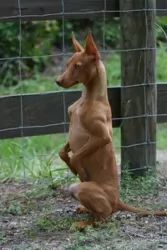 The Podenco Andaluz hails from the Andalusian region of southern Spain. It is believed that this dog is likely to have descended from the European hunting dog.
The Podenco Andaluz hails from the Andalusian region of southern Spain. It is believed that this dog is likely to have descended from the European hunting dog.
Because of the lack of distinctive characteristics, and also the similarities the dog shares with other dog breeds, the dog isn’t typically recognized in its own right. They have always been used as hunting dogs. The Andaluz is actually one of the lesser known Podencos and it isn’t recognized by the FCI.
 The history of the Dalmatian dog is also fairly scant, and the information you get is often unclear.
The history of the Dalmatian dog is also fairly scant, and the information you get is often unclear.
The name Dalmatian wasn’t used until the end of the 18th century, although it seems as though, according to murals on ancient tombs, there were white hounds then with specks over the body.
It does seem firm that the modern Dalmatian is because of breeding of the English nobility. They used these dogs to accompany them on their carriages. The dogs were also bred with the purpose of getting an exquisite spotted pattern.
It was in 1890 that the first Dalmatian Club was established in England and the dog was recognized by the American Kennel Club in 1888.
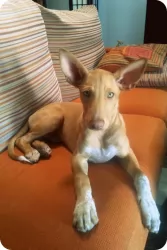 There are three different Andalusian Hounds - small, medium and large, but for the sake of space, we refer to the medium sized dog. The medium sized dog stands at between 42 and 53cm and weighs roughly 20 – 22kg.
There are three different Andalusian Hounds - small, medium and large, but for the sake of space, we refer to the medium sized dog. The medium sized dog stands at between 42 and 53cm and weighs roughly 20 – 22kg.
The dog has short hair, large erect ears and a long tail. Regarding color, most of these dogs are a reddish brown or plain brown color with some having patches of white.
The Andaluz is a dog which is reserved with strangers, but with their owners they are loyal and loving and never aggressive. The Andaluz is considered a one-man dog but he is more than capable of showing love and affection for all members of his human family.
This dog will benefit from training and socialization as this makes him more sure of himself and more obedient. He is an intelligent dog and won’t battle to learn simple commands. You’ll find your Podenco Andaluz to be sweet, calm and gentle indoors with training. He loves to lie close up to you,preferably on the couch right next to you!
 The Dalmatian is a medium sized dog with its beautiful white coat with black or liver spots being its main feature. The coat is short and dense and the Dalmatian pretty much sheds all year round.
The Dalmatian is a medium sized dog with its beautiful white coat with black or liver spots being its main feature. The coat is short and dense and the Dalmatian pretty much sheds all year round.
It is notable that at birth, the puppies are pure white, with their spots starting to form about 4 weeks later.
Both the male and female stand at anything between 56–61cm in height and weigh between 22 to 35kg. He is a slender, muscular dogs with plenty of stamina. The ears of the dog are floppy, he has brown eyes and a long tail.
With his human family, the Dalmatian is an active, playful dog. He has the reputation of being somewhat unfriendly and aloof, but many who have kept him as a pet say this isn't so. He loves to take part in games and gets on well with children in the home.
He is intelligent, but when it comes to strangers, the Dalmatian is reserved and even aloof. If you want to get the best from your Dalmatian, make sure that he is trained and socialized as he then knows how to behave well around people. He makes a good watchdog too.
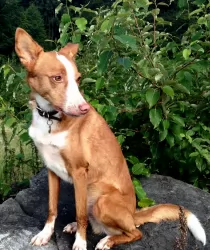 This dog has always been a hunting dog, and an excellent one at that. These days he is also a companion animal. It is very sad that these dogs have been given a cruel deal in Spain.
This dog has always been a hunting dog, and an excellent one at that. These days he is also a companion animal. It is very sad that these dogs have been given a cruel deal in Spain.
For those that make it into a loving home, they have proved to make excellent low maintenance dogs who are willing to provide their human family with faithful love and companionship that only a dog can provide.
 The Dalmatian is such a beautiful dog, energetic and playful and he is good with pets and children in the home.
The Dalmatian is such a beautiful dog, energetic and playful and he is good with pets and children in the home.
He is intelligent too and training and socialization for him will be easy and promise to bring out all his good points.
The Dalmatian became popular in the 1800's when they were used as coach-dogs, and their popularity has been enhanced because of films from Hollywood such as ‘101 Dalmatians’.
Unfortunately many people receive Dalmatian puppies as gifts after seeing movies like this and then hand their dogs into rescue centers when they grow up and are no longer the cute little puppy they first met.
Be a responsible dog owner. A Dalmatian has feelings and you need to commit to caring for him for up to 15 years. You’ll be rewarded by having a wonderful, loyal canine friend.
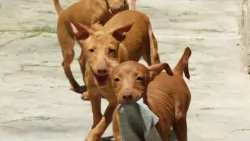 Your Podenco Andaluz is a robust dog breed and doesn’t battle with any health conditions. However, having said that, every dog can battle with some of the more common dog illnesses, and then your dog may well have to visit the vet.
Your Podenco Andaluz is a robust dog breed and doesn’t battle with any health conditions. However, having said that, every dog can battle with some of the more common dog illnesses, and then your dog may well have to visit the vet.
Remember, that to give your dog the best chance, the dog should receive vaccinations to protect him from some life-threatening diseases.
This disease is brought about by the protozoan parasite Leishmania. The dog gets into trouble with this disease when sand-flies transmit parasites into the skin of the dog. The disease spreads to most organs, with kidney failure being the most common cause of death.
This is a fatal disease that is contracted through the bite of an infected mosquito. It is serious and will require veterinary intervention as its a disease that can create problems with the animal’s heart.
This is a fatal viral disease that can be passed on to your pet and affects the central nervous system. A dog with rabies is nearly always a dead dog, sadly. Symptoms include excess drooling, aggression and seizures.
 Dalmatians, with good care, can live to be about 10 to 15 years. However, just as with other breeds, the Dalmatian is prone to certain health problems that are more specific to their breed. Some of these problems are skin allergies, deafness and urinary stones.
Dalmatians, with good care, can live to be about 10 to 15 years. However, just as with other breeds, the Dalmatian is prone to certain health problems that are more specific to their breed. Some of these problems are skin allergies, deafness and urinary stones.
Dalmatians are known to have sensitive skin and they are prone to topical allergies. When you brush your dog, you should check his skin for redness and also check for fleas and ticks.
Red bumps on his skin could mean an allergy and can be distressing for your pet. Your pet may be scratching excessively and the skin may be red and moist with runny, itchy eyes. It is time to get your dog to the vet, who may prescribe an antihistamines to get the itching and allergies under control.
Unfortunately, the Dalmatian is a dog which has a tendency to form stones in the kidneys and bladder. A genetic mutation causes the raised uric acid levels which is more prevalent with the male Dalmatian. Straining to urinate can be tremendously stressful for your dog and you will need to get him to the vet immediately.
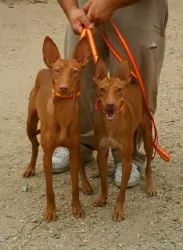 This has always been a hunting dog so he is used to running long distances. He is best suited to life in the countryside as opposed to life on a small property in the city. You will certainly need to take him on walks. If you are lucky enough to live near the beach, you can take bat and ball and hit the ball hard with the beach-bat, allowing your dog to race at top speed to fetch it.
This has always been a hunting dog so he is used to running long distances. He is best suited to life in the countryside as opposed to life on a small property in the city. You will certainly need to take him on walks. If you are lucky enough to live near the beach, you can take bat and ball and hit the ball hard with the beach-bat, allowing your dog to race at top speed to fetch it.
Regular brushing, at least twice a week will be required for the Podenco Andaluz. It’s a good idea to check your dog over for any odd lumps and for ticks and fleas. Keep his nails trimmed and check his ears and eyes for infection.
Every dog requires a good diet if good health and longevity are to be expected. Always check the labels of commercially manufactured dog foods to ensure that your dog gets a good dose of protein in.
The best quality foods have a good balance of vitamins and minerals in them, whereas some of the poorer quality foods have bad ingredients such as preservative, colorants and fillers.
Try and give your dog some wholesome home-made food such as boiled chicken, brown rice or pasta, sweet potatoes, spinach and carrots. Also, some raw meat occasionally will benefit your dog too, after all dogs have always been carnivores.
 The Dalmatian is an easy dog to maintain and brushing twice a week will get rid of loose hairs. What is notable with the Dalmatian is that not only does he look like a well groomed dog, he also doesn’t have that typical dog smell around him.
The Dalmatian is an easy dog to maintain and brushing twice a week will get rid of loose hairs. What is notable with the Dalmatian is that not only does he look like a well groomed dog, he also doesn’t have that typical dog smell around him.
No matter what kind of dog you have, a high-quality dog food is always beneficial for your dog’s health. Home-made food is always good for your dog and wholesome food such as brown rice, vegetables and some cooked chicken will delight your pet and keep him interested in his food.
There are also excellent manufactured foods and kibble is a good food to have when you select it according to your dog’s age and energy levels.
These foods, especially the top quality ones, ensure your pet gets all the nutrients he needs. Adding some raw meat into the diet can be highly beneficial for your pet and will keep him bright eyed, bushy tailed and with a wet nose.